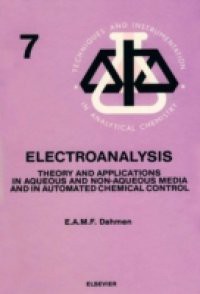Electroanalysis as a representative of the wet-chemical methods has many advantages, such as: selectivity and sensitivity, nothwithstanding its inexpensive equipment; ample choice of possibilities and direct accessibility, especially to electronic and hence automatic control even at distance; automated data treatment; and simple insertion, if desirable, into a process-regulation loop. There may be circumstances in which an electroanalytical method, as a consequence of the additional chemicals required, has disadvantages in comparison with instrumental techniques of analysis; however the above-mentioned advantages often make electroanalysis the preferred approach for chemical control in industrial and environmental studies.This book provides the reader with a full understanding of what electroanalysis can do in these fields. It presents on the one hand a systematic treatment of the subject and its commonly used techniques on a more explanatory basis, and on the other it illustrates the practical applications of these techniques in chemical control in industry, health and environment. As such control today requires the increasing introduction of automation and computerization, electroanalysis with its direct input and/or output of electrical signals often has advantages over other techniques especially because recent progress in electronics and computerization have greatly stimulated new developments in the electroanalysis techniques themselves. Part A looks systematically at electroanalysis while more attention is paid in Part B to electroanalysis in non-aqueous media in view of its growing importance. The subject is rounded off in Part C by some insight into and examples of applications to automated chemical control.

